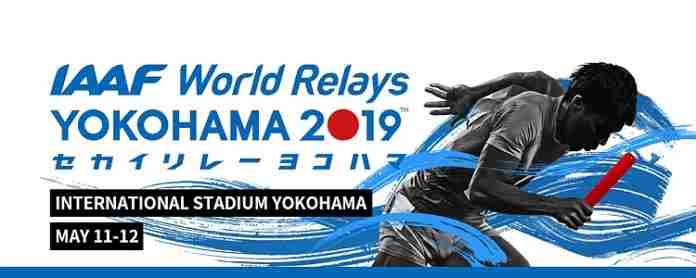The IAAF got onto the relay bandwagon in 2014 when the first World Relays was held in Nassau (BAH) and became an instant hit. The event was fun, fast and different and exposed track & field fans worldwide to the joy of relays already well known in the U.S.
After three editions in The Bahamas – in 2014-15-17 – the island’s government decided not to continue to invest approximately $5 million per edition and the event is being held in Yokohama (JPN) this weekend. The finals schedule:
● 11 May: Mixed 2x2x400 m, Mixed Shuttle Hurdles Relay
● 12 May: Men’s and women’s 4×100 m, 4×200 m, 4×400 m, Mixed 4×400 m
In keeping with the IAAF’s movement away from distance races, there is no 4×800 m, 4×1,500 m or Distance Medley. Instead, we have the Mixed races: 4×400 m, the Shuttle Hurdles and the 2x2x400 m, in which two athletes – one man, one woman – each run two legs of 400 m in any order desired.
Important? No. Fun? Maybe; we’ll see.
There is one important aspect to the meet: qualification for the 2019 World Championships in Doha (QAT). The top 10 teams in the men’s and women’s 4×100 m and 4×400 m, and top 12 in the Mixed 4×400 m will qualify for Doha. That’s important: even if a team drops the baton in the final, it needs to try and complete the race without disqualification in order to be assured in a place in the Worlds.
There is also some good prize money on offer: $50,000-30,000-20,000-12,000-10,000-8,000-6,000-4,000 for the top eight places and half of that for the 2x2x400 m, which has two athletes per team instead of four. There is a $50,000 bonus for a world record, but this does not apply to the Mixed 4×400 m, Shuttle Hurdles or 2x2x400 m races.
The 72,000-seat Yokohama International Stadium will be the site, with 761 athletes from 45 countries registered for the event. A look at some of the potential highlights:
● Men/4×100 m:
On paper, the U.S. has the best team, with five nominated: Chris Belcher (9.93 in 2017), Cameron Burrell (9.93 in 2018), Justin Gatlin (10.03 in 2018), Noah Lyles (9.88 in 2018) and Michael Rodgers (9.89 in 2018). As always, the question is whether they can get the stick around the track. Gatlin eased up, fearing injury, in the Grenada Invitational 200 m on 13 April, but is listed as ready to run.
If the U.S. is right, everyone else is running for second. Canada should have an excellent team with Aaron Brown, Gavin Smellie, Brendon Rodney and Andre De Grasse all available and the next generation of Jamaican sprinters will be on display with veteran Nesta Carter teaming with Julian Forte, Jevaughn Minzie and Tyquendo Tracey. Great Britain has three quality legs available in Adam Gemili, Nethaneel Mitchell-Blake and C.J. Ujah and China will always be a factor with Bingtian Su on anchor.
The wild card is Japan, running in front of a home crowd. With perfect passing, it claimed the bronze medal at the 2017 World Championships, running 38.04. This week’s team is different, but precision passing can make them a contender again.
● Men/4×400 m:
The U.S. has won all three editions of this race at the World Relays, each time anchored by LaShawn Merritt. He’s not around this time, but the U.S. has a good foursome available with Paul Dedewo, Michael Cherry, Josephus Lyles and Fred and My’Lik Kerley.
But no one is going to be surprised if someone else wins this time, although no one knows who that will be. The Bahamas has Steven Gardiner available and if he gets the stick and is close to the leaders, he’ll likely win. Belgium has the three Borlee brothers – Dylan, Jonathan and Kevin – and with Jonathan Saccor, could win. Botswana has Isaac Makwala and Baboloki Thebe, but what about the other two legs?
Maybe Jamaica should be favored, with Nathon Allen, Akeem Bloomfield and Demish Gaye all capable of running with anyone, but what about the fourth leg? The same could be said for Trinidad & Tobago, which has quality legs in Machel Cedenio, Deon Lendore and Jereem Richards, but what about a fourth? This should be one of the really exciting races of the meet.
● Women/4×100 m:
The U.S. has a good team, with Dezerea Bryant, Ashley Henderson, Aleia Hobbs, Jenna Prandini and Tori Bowie, but what about the stickwork? Is Bowie healthy again?
The Jamaican and Trinidad & Tobago teams should be able to run with the U.S. Jamaica has Gayon Evans, Shashalee Forbes, Natalia Morrison and veteran Sherone Simpson available and they could be formidable if in shape. Trinidad & Tobago will field Michelle-Lee Ahye, Semoy Hackett and Khalifa St. Fort and hope that either Kamaria Durant or Reyare Thomas are the right fit as the fourth leg.
Poland will have indoor star Ewa Swoboda on anchor; Germany and Japan will depend on perfect passing to be in position for medals.
● Women/4×400 m:
The U.S. is favored here too, but with a good team that should have more depth than anyone else. Jessica Beard, Courtney Okolo, Jordan Lavender, Jaide Stepter and reigning national champ Shakima Wimbley are all quality runners, but hardly unbeatable. Jamaica has two excellent legs in Crisann Gordon and 400 m hurdles star Janieve Russell, and Swiss star Lea Sprunger could do a lot of damage on anchor if she is close.
This is not a superstar-filled meet and coming fairly early in the season, there are a lot of folks who have passed on participating.
In the other events, the Mixed 4×400 m is still a developing event, but has some stars listed as possible entries: Kevin Borlee for Belgium, 800 m star Nijel Amos for Botswana, and the U.S. has Ja’Von Hutchison and Nathan Strother listed, along with Olivia Baker and Jasmine Blocker for the women’s legs, among others.
The U.S. has an excellent entry into the silly 2x2x400 m race with 800 m specialists Donavan Brazier and Ce’Aira Brown, both of whom are in strong shape already this season.
The American team also has a big edge in the Shuttle Hurdles relay for two reasons: (1) it’s an excellent squad with Devon Allen and Freddie Crittenden available for the men, and Shakira Nelvis, Christine Clemons and Queen Harrison available for the women, and (2) most of the U.S. team has actually seen this race take place before, where many of the others will see it for the first time in Yokohama.
During the first three editions, the U.S. dominated the event, winning 17 of the 28 events, to five for Jamaica and three for Kenya.
NBC’s Olympic Channel has coverage of the World Relays, on Saturday at 6 a.m. Eastern time (and a replay at 6 p.m. Eastern), and on Sunday at 7:30 a.m. Eastern time. Look for results here.

























